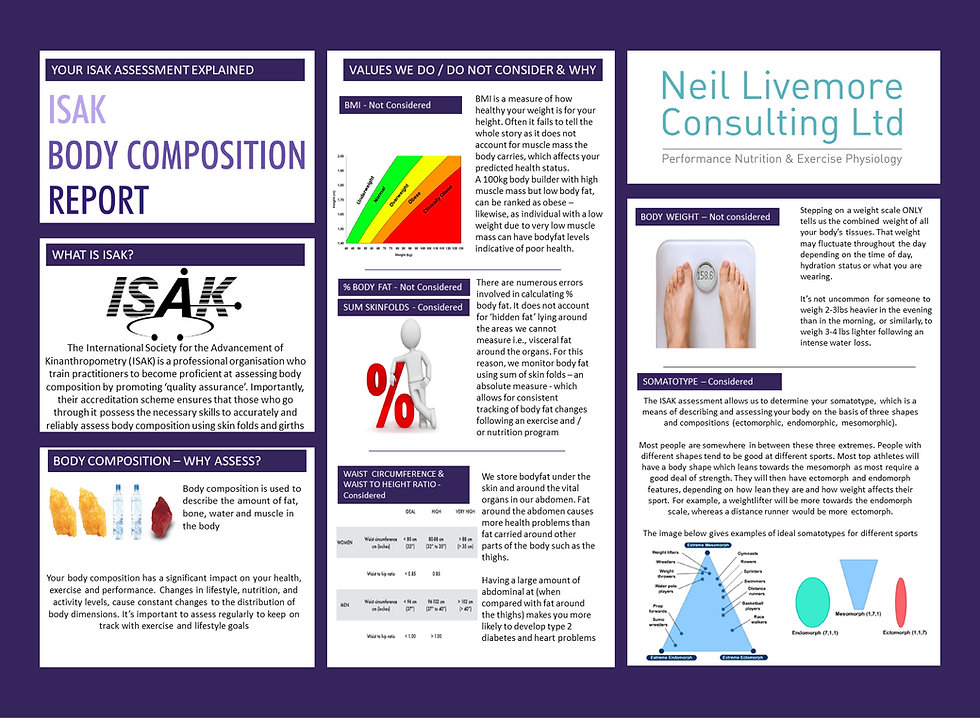Service Spotlight - Resting Metabolic Rate Analysis
- Neil Livemore

- Jun 6, 2022
- 3 min read
Updated: Oct 14, 2024

Keep hitting a barrier to weight management goals, or feeling under fuelled as an athlete?
Read on to find out more about our resting metabolic rate analysis.
Our metabolisms are dynamic, can change over time and are often different from the "general" calculators found online. At any time in our lives, different factors can impact our metabolic rate and the calories we need. Chronic underfuelling via restrictive diets for weight loss and athletes with large training loads and sports nutrition considerations who fail to reach the increased of activity may have the same adaptive impact on metabolism.
This "low energy availability" can suppress various physiological functions, impact mood, daily performance, increase risk of injury, make weight loss goals an uphill battle, and weight regain an eventual common outcome.
For weight management goals, changes in mass, the body conserving more energy through reductions in non-exercise activity thermogenesis (such as reduced fidgeting and general movement), a lower thermic effect of food, and a reduced metabolic rate can make it hard to reach long-term sustainable targets especially when we aren't sure of the cause.
The modern-day
While these factors would be a beneficial tool for survival through evolution during challenging times (think famine), technological advances with modern lifestyles have significantly altered our relationship with food. Where our bodies previously, adapted to scarcity, it would not be able to differentiate between famine and a deliberate weight loss strategy. Instead, it's percevied as reduced energy intake, survival response, similar to famine. This evolutionary mismatch has implications for our health and well-being in the modern day.
There are ways to get answers and take action:
The most powerful approach is to "triangulate" from different angles to get a complete picture (not a one-sided view):
Is metabolism slow? Resting metabolic rate assessment through gas analysis (not an online calculator).
Does dietary intake align with goals? Dietary analysis (most people incorrectly estimate their day to day nutrition.
Does nutrition match metabolism and daily demands? Analysis of daily demands (different activity levels = different needs).
A fourth option may be a recommended which is a blood test.
These three assessments provide an invaluable window into our metabolism and needs to remove assumptions and guesswork, they show the main factor/s for not reaching goals and how to achieve them. For people chronically under fuelled a restorative period of maintenance to achieve a healthier position.

Extra credit:
What is resting metabolic rate?
Metabolism is the chemical processes that occur within your body to maintain life. Various factors such as age, sex, body composition, body mass, hormones and gender (among others) can impact this, making it not only highly unique between individuals, but can vary at any one point in your life – and why general guidelines are often not accurate.
Why is it important to know?
Knowledge of resting metabolic rate (RMR) is important in health, weight management and performance applications for defining appropriate nutritional support and determining caloric needs for energy balance, weight management and performance.
Some of the reasons to test for metabolic rate?
Screen for a slowed (or fast) metabolism
Flag the reason for possible failed attempts to lose weight in the past.
Provide the precise number of calories you need to manipulate body composition or fuel performance.
Reveal changes in metabolism during a calorie restriction or training phase.
Give you the precise caloric prescription to sustain your goals once you reach them.
What can chronic incorrect nutritional intake to metabolism cause?
Unwanted or excessive weight loss / weight gain
Mood disturbances
Sleep disturbances
Muscle and bone mineral density loss
Reduced performance
Reduced immunity
Reduced recovery
Reduction in hormones (increase in stress hormones)
Growth and development issues
Irregular menstrual function
Remember, “assess, don’t guess”

--------------------
How can we help support your goals?
Individual consultancy
Nutritional support and development process
Assessments
Physiological testing
Team support
Team education
Mentoring
Interested in our primary services?
FREE PHONE CONSULTANCY
Use the contact form below to request more information or arrange a free phone call to discuss your needs.






As a "corporate athlete" this test was a bit of an eye opener! I assumed I had a slow metabolism, and it was slightly slow but the result removed the guess work as you say and helped me zone in on the area I should actually focus on!